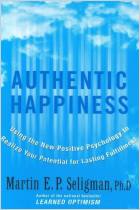Зарегистрируйтесь на getAbstract, чтобы получить доступ к этому краткому изложению.

Зарегистрируйтесь на getAbstract, чтобы получить доступ к этому краткому изложению.
Martin E.P. Seligman
Learned Optimism
How to Change Your Mind and Your Life
Vintage Books, 2006
Что внутри?
Make optimism work for you. Believing that a positive future is possible actually makes it easier to achieve.
Recommendation
Despite equal talent and drive, it turns out that optimists will succeed where pessimists fear to tread. The good news is that you can learn optimism and lean on it to respond to adversity and inculcate greater resilience. Through descriptions of dozens of studies performed since the ’70s, author Martin Seligman conveys the history and landscape that define "positive psychology," the science he helped to found. He offers cognitive techniques designed to tweak your natural disposition and give you the advantage of optimism. getAbstract recommends this book as a seminal work of positive psychology.
Summary
About the Author
Martin E.P. Seligman, Ph.D. is a psychology professor at the University of Pennsylvania and past president of the American Psychological Association. He is a pioneer in the field of positive psychology and the author of Authentic Happiness and The Optimistic Child.



















Comment on this summary